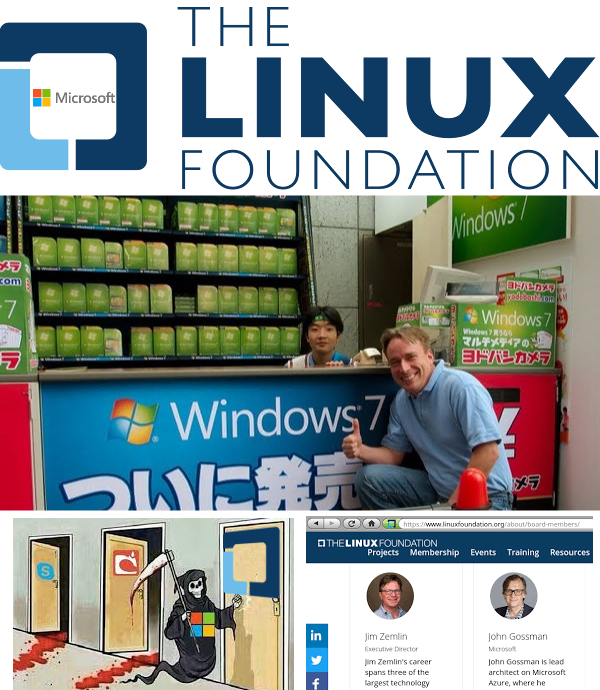

THE Linux Foundation is promoting proprietary software and putting its projects in a proprietary software cage called GitHub, even more so after Microsoft bought GitHub. We've provided ample evidence in past articles.
"How can something called "Linux Foundation" be so hostile towards Linux? And almost nobody who works there even uses Linux!"Today we deal with a bit of a 'sacred cow' because IBM owns Red Hat and Red Hat is undeniably a massive contributor to Linux. So we'll be gentle.
Two days ago the Red Hat-friendly press (neighbour, physically) published "Why IBM embraces is embracing, expanding open hardware ecosystem in wake of Red Hat deal" (maybe joining consortia like RISC-V's is applicable here).
But this is not about RISC-V.
There's no need for us to dwell or obsess over the latest widely-covered announcements; we've included quite a lot about this in our daily links, including the calling of surveillance "confidential" and "security" (that's one heck of a laughable newspeak right there!) and some AGL stuff.
We must admit that in relative terms the announcements from the Open Source Summit aren't as controversial and infuriating as some which we came across in the past, so we won't spend much time 'bashing' the Foundation over these.
The Open Source Summit has long been a sales event of proprietary software -- just look at their marketing brochures and what's on offer. We showed this in a series of posts earlier this year.
"The Open Source Summit has long been a sales event of proprietary software..."Further analysis of the announcements (there were three "major" ones) highlights areas of reservations, concerns, and justified scepticism. Much of it is the Foundation's infamous openwashing as a service (OaaS). The way we see it, OpenPOWER is openwash mostly. And passing it to the Foundation is adding the perception of "independence". Here's some coverage from SDxCentral and FierceTelecom, which are sites close to the Foundation. A decades-long IBM advocate, Timothy Prickett Morgan, says "instruction set architecture of its Power family of processors" is what IBM 'opened'. He wrote that in The Next Platform. [via OSnews]
"IBM Power chip instruction set now open source" said TechTarget's headline. The problem is, this "open" power (or POWER) is... Microsoft-hosted.
"What da heck," you say?
Exactly!
It's part of a disturbing pattern/trend we've noted several times throughout the year.
How much "open" is there in OpenPOWER?
Not that much. It's more like "open core".
"How much "open" is there in OpenPOWER?"The real reason IBM is open-open-openwashing its "Open(R)" Power(TM) is that it's trying to out-open what's free/libre, RISC-V. The Register's headline was right on point: "IBM hears the RISC-V kids partying next door, decides it will make its Power CPU ISA free, too"
Can IBM also 'own' the word "Open"? Not really. It can, however, leverage it. There's no legal enforcement.
Microsoft -- like IBM -- has long exploited brands that aren't its own. IBM called its hugely expensive servers LinuxONE, piggybacking the "Linux" brand to sell something that's not necessarily tied to GNU/Linux.
"The aim is obvious," said the above article from The Register. It's "to encourage the implementation of OpenPower CPUs, and get more Power-based systems out into data centers and the wider world. It also means engineers can customize their own OpenPower chips to run particular AI or analytical workloads, for example."
"“Open" as in OpenPOWER doesn't mean you can replicate POWER without risk of patent lawsuits."Some further coverage from sites loosely connected to IBM (e.g. HPCwire) further reinforces our suspicion. It's a marketing blitz mostly, aided by corporate media like CBS. The name OpenPOWER isn't new. They just reiterate old news and do a dance with the Foundation to make it seem independent, not just "open".
Can anybody now replicate OpenPOWER? No. What IBM means by "open" isn't quite it; they'd likely lob lots of patent lawsuits at anyone who dared try... remember TurboHercules?
Sadly, IBM hasn't changed when it comes to patent policy. Red Hat is now owned by a patent bully that's still lobbying for software patents and as IAM put it the other day: "In the 1990s IBM made billions from patent royalties. The principles that guided Big Blue to unprecedented licensing success still hold true today."
They're still doing it. "Open" as in OpenPOWER doesn't mean you can replicate POWER without risk of patent lawsuits. ⬆